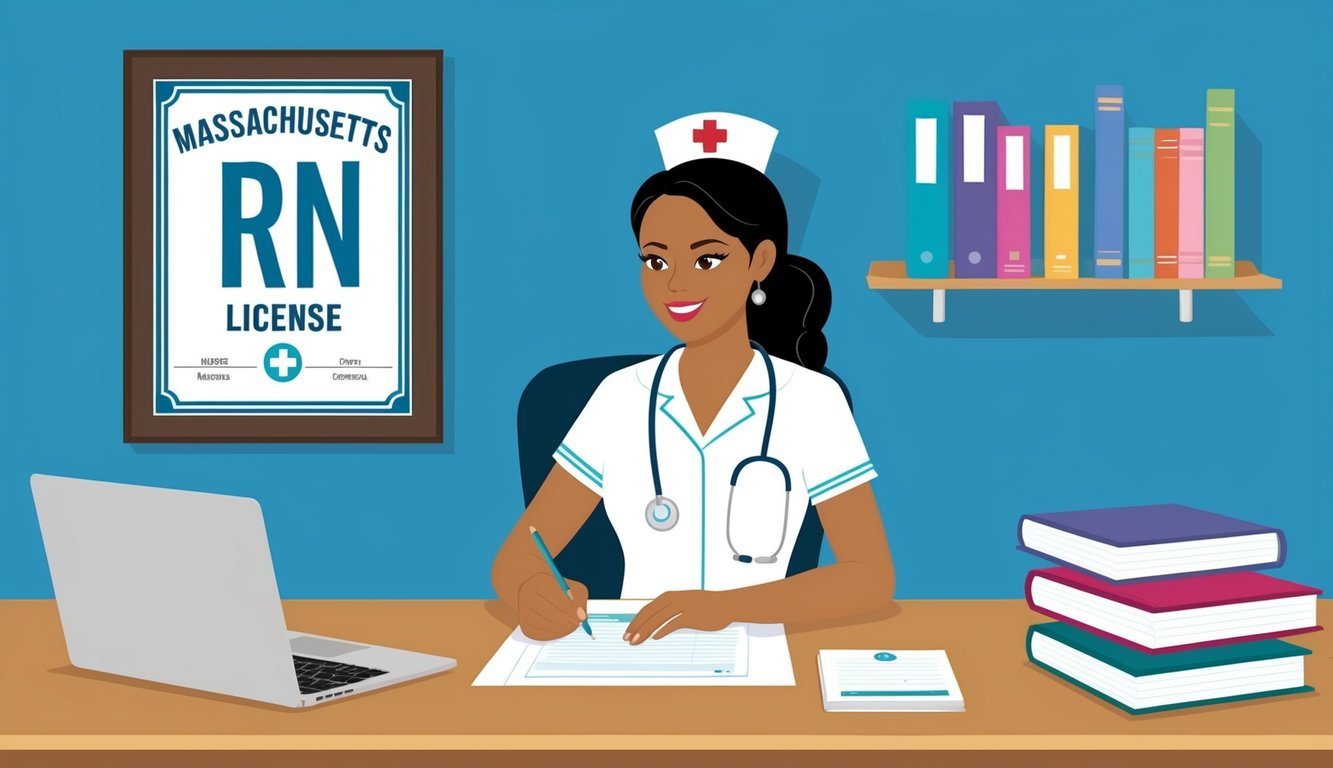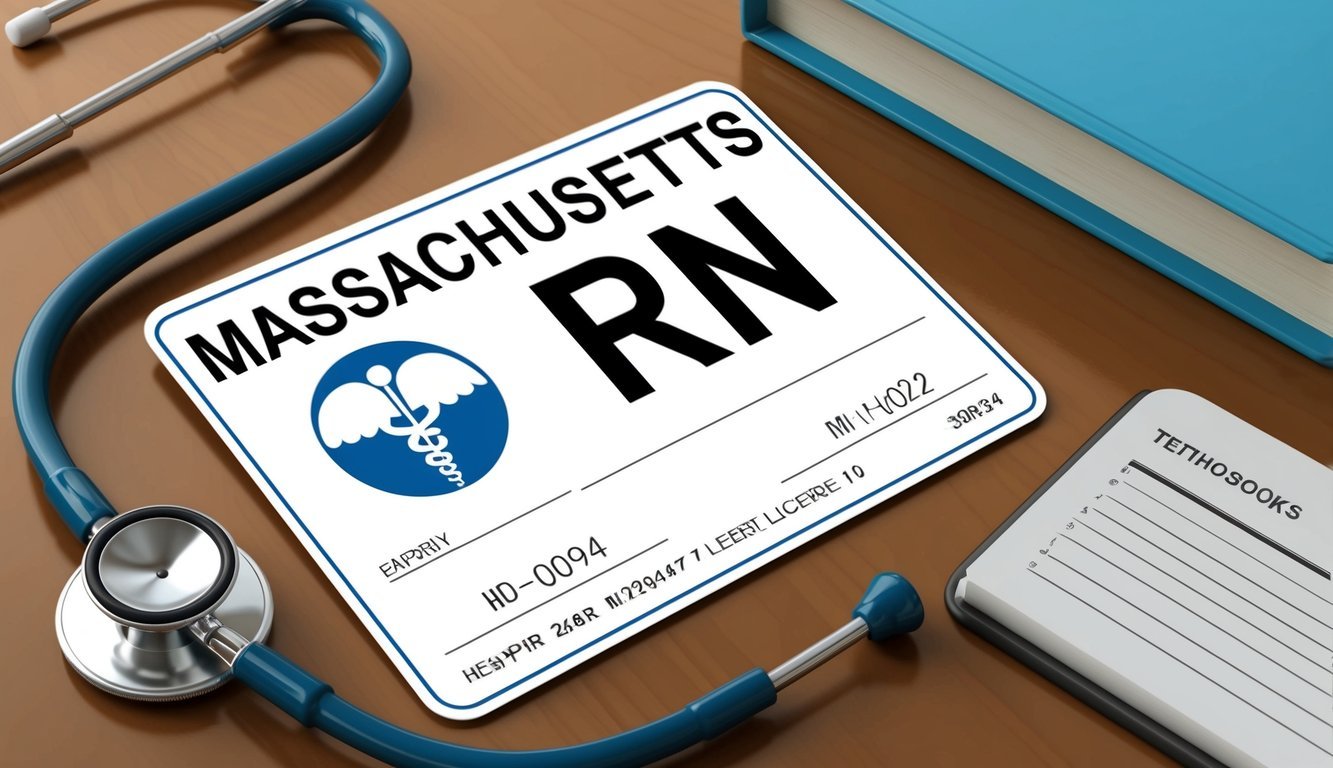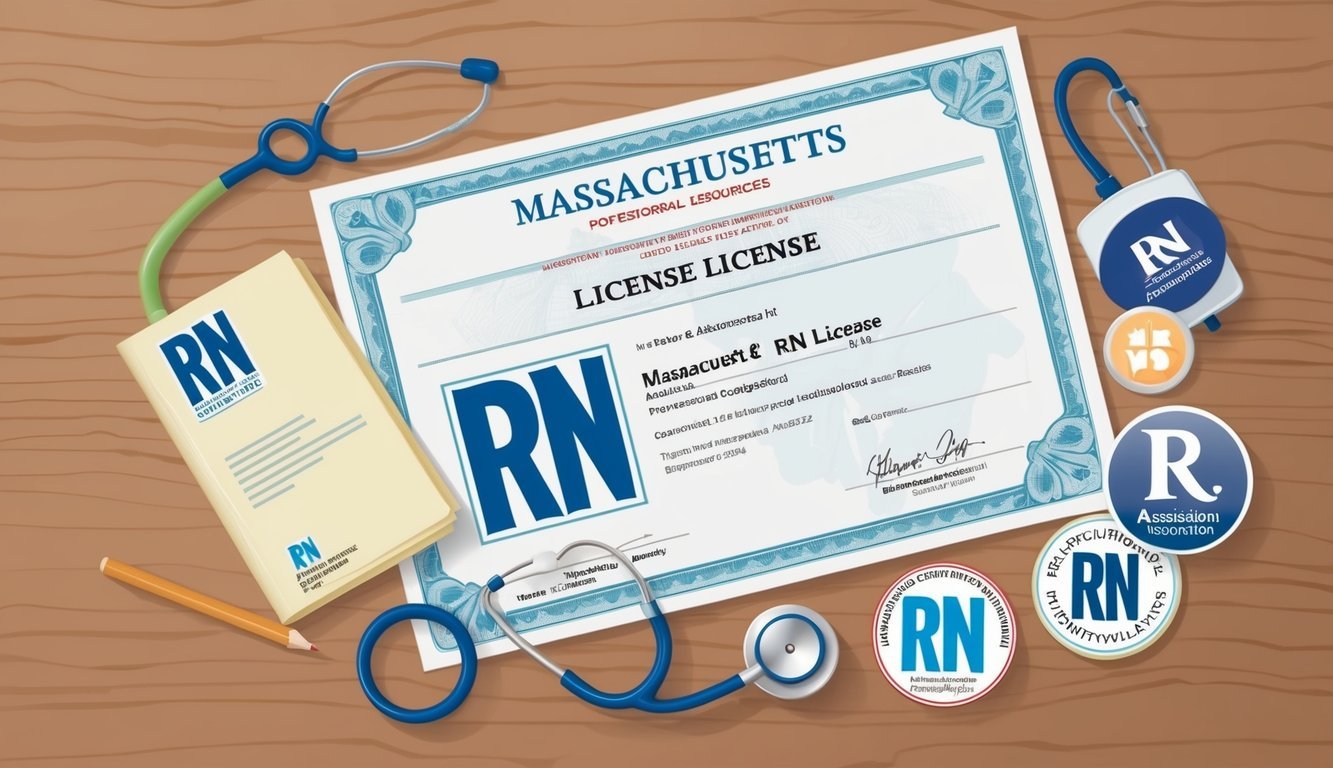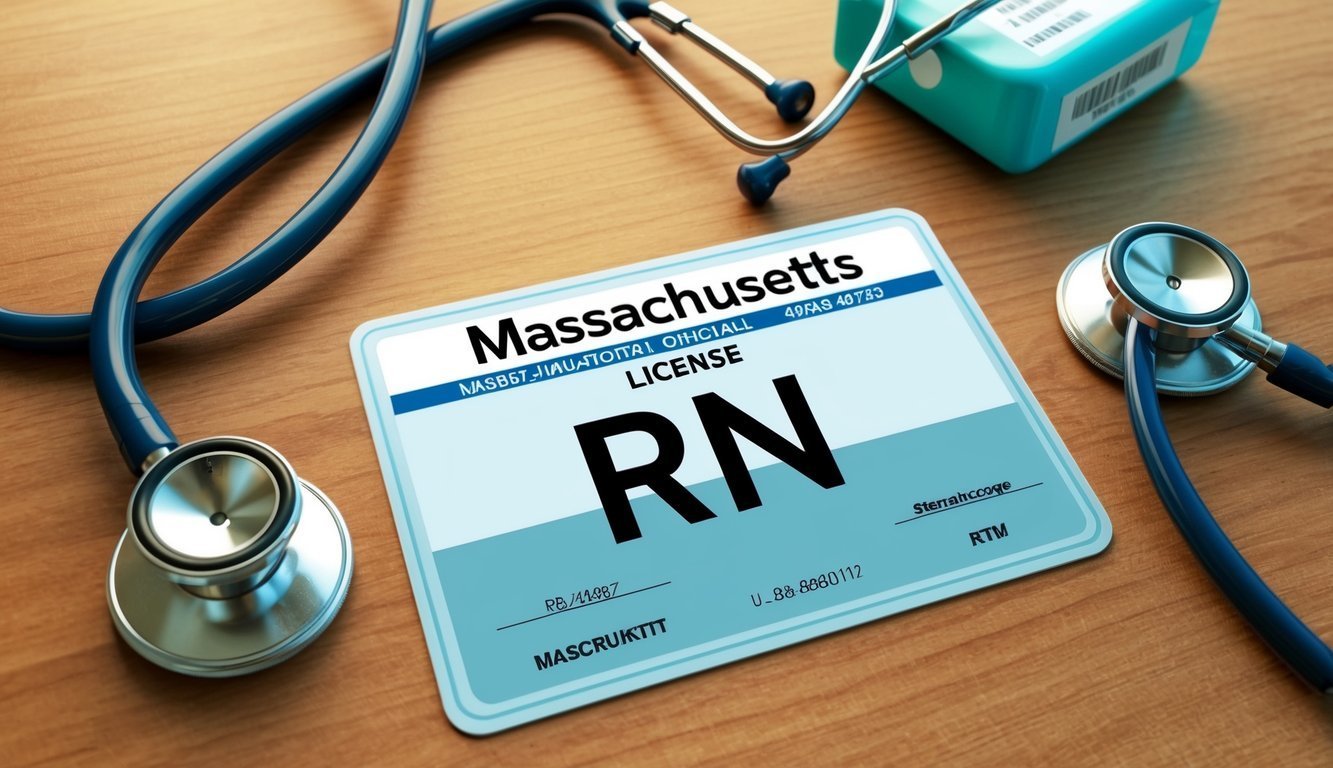Becoming a Registered Nurse (RN) in Massachusetts involves meeting specific requirements and completing a structured licensure process.
To earn your RN license, you must complete an approved nursing program, pass the NCLEX-RN exam, and submit a comprehensive application.
Understanding these steps will help streamline your journey to a rewarding nursing career.
As you explore the requirements, you’ll find that maintaining your license is just as important as obtaining it.
Regular continuing education and renewal processes are necessary to stay compliant with state laws.
By knowing what is required, you can focus on your professional development while ensuring you meet all necessary regulations.
In this blog post, you will discover everything you need to know about obtaining and maintaining your Massachusetts RN license.
From the initial steps to useful resources, we’ve compiled essential information to guide you through the process.
Key Takeaways
- You need to complete an approved nursing program and pass the NCLEX-RN exam.
- Regular continuing education is required to maintain your license.
- Utilize professional resources for support throughout your nursing career.
Overview of Massachusetts RN License Requirements

To become a Registered Nurse (RN) in Massachusetts, you need to complete specific requirements.
This includes meeting eligibility criteria and passing the NCLEX-RN exam.
Understanding these requirements is essential for a successful application.
Eligibility Criteria
To qualify for an RN license in Massachusetts, you must meet several key requirements.
First, you need to complete an approved nursing program.
These programs can be:
- Associate Degree in Nursing (ADN): Typically takes 2-3 years.
- Bachelor of Science in Nursing (BSN): Usually takes 4 years.
In addition to completing a nursing program, you must demonstrate good moral character.
This may involve background checks and disclosing any criminal history.
You also need to submit an application to the Massachusetts Board of Registration in Nursing and pay the required fees for licensure.
NCLEX-RN Exam Information
After meeting eligibility criteria, you must pass the NCLEX-RN exam.
This exam tests your knowledge and skills necessary for safe and effective nursing practice.
Here are important steps regarding the exam:
- Registration: You must register with Pearson VUE and request authorization to take the exam.
- Fees: The cost for the NCLEX-RN exam ranges from $200 to $500.
- Content: The exam covers several areas, including patient safety, health promotion, and medical-surgical nursing.
Passing the NCLEX-RN is crucial, as it is a requirement for obtaining your RN license.
You can find further details about the test on the NCLEX official website.
The Licensure Process for Registered Nurses

Navigating the licensure process for registered nurses in Massachusetts involves several important steps.
Understanding these steps will help ensure that you meet all requirements efficiently.
Application Steps
To obtain your nursing license, you need to follow a series of steps outlined by the Massachusetts Board of Nursing.
The process generally includes:
-
Complete an Approved Nursing Program: Ensure that you graduate from an accredited program, which typically includes both theoretical and practical training.
-
Apply for Licensure: Submit your application through the Nursing Board’s official website. You will need to provide documentation of your education and possibly your clinical hours.
-
Register for the NCLEX-RN: You must pass the National Council Licensure Examination (NCLEX-RN). Registration can be done through the Pearson VUE website.
-
License Verification: Use the Nursys license verification system to verify your application status and confirm that your credentials meet state requirements.
-
Receive Your License: After completing the above steps and passing the NCLEX-RN, you will receive your nursing license.
Foreign Educated Nurses
If you are an internationally educated nurse, the process for obtaining a license can be more complex.
Here’s what you should know:
-
Credential Evaluation: You must have your nursing credentials evaluated by a recognized agency. This may include proving equivalency with a U.S. nursing program.
-
English Proficiency: Demonstrating English proficiency is required. This can be done through tests like TOEFL or IELTS, depending on the Board’s requirements.
-
Application Submission: After the evaluation, you will follow similar steps as native applicants, including submitting your application and registering for the NCLEX-RN.
-
Additional Documentation: Be prepared to provide more detailed documentation, such as proof of your nursing practice and any licenses held in your home country.
-
Consult the Board: It’s advisable to consult the Board of Registration in Nursing for specific guidelines that may apply to your unique situation.
Maintaining Your Massachusetts RN License

To keep your Massachusetts RN license active, you need to complete the renewal process and meet continuing education requirements.
This ensures that you stay updated on nursing practices and regulations.
License Renewal Process
To renew your nursing license in Massachusetts, you must complete the renewal application online through the Massachusetts Department of Public Health eLicensing System.
The renewal fee is $120.
It’s important to submit your application before the expiration date to avoid late fees.
You will need to provide proof of your continuing education credits, which are required for renewal.
Additionally, if you’re an Advanced Practice Registered Nurse (APRN), you must have a current APRN certification from a recognized national organization.
For further details, visit the Massachusetts Nursing Licenses page.
Continuing Education Requirements
You are required to complete a minimum of 15 contact hours of continuing education every two years for RN license renewal.
These hours must include training on mandatory abuse reporting laws and may also involve domestic and sexual violence training.
You should ensure that your chosen courses are approved by the Massachusetts Board of Registration in Nursing.
Check the continuing education guidelines to find acceptable programs.
Meeting these requirements helps you provide quality care and stay compliant with state regulations.
Additional Licensure Information

When pursuing a nursing license in Massachusetts, it is important to understand the options available for obtaining licensure, including pathways for those licensed in other states.
Below are key details for reciprocity, endorsement, and LPN-specific licensing.
Licensure by Reciprocity
You can obtain a Massachusetts RN license through licensure by reciprocity if you are already licensed in another U.S. state.
This option allows you to transfer your existing license without retaking the exam.
To qualify, you must:
- Hold a current, unencumbered RN license from another state.
- Submit a completed application along with a non-refundable fee.
- Provide proof of your education and any required certifications.
Reciprocity licenses are subject to the same renewal and continuing education requirements as original licenses.
Your late renewal fee may apply if you do not renew on time.
For more details, visit Massachusetts Nursing Licenses.
Licensure by Endorsement
Licensure by endorsement is another option for those who have completed a nursing program but are licensed in different states.
This pathway requires that you have passed the NCLEX-RN exam and can demonstrate your education meets Massachusetts standards.
Steps to apply include:
- Submit an endorsement application specific to Massachusetts.
- Provide verification of your valid license from the issuing state.
- Present transcripts directly from your nursing school.
This process also requires adherence to renewal guidelines and continuing education credits.
Be mindful of documentation needed to demonstrate your qualifications.
More information can be found on U.S. Nursing.
Massachusetts Nursing Licenses for LPNs
Licensed Practical Nurses (LPNs) in Massachusetts must follow a separate process for licensure.
If you are an LPN looking to become an RN or seeking an LPN license, be prepared for the specific requirements.
Key points include:
- Completing an approved practical nursing program.
- Passing the NCLEX-PN examination.
- Submitting an application with required fees.
For LPNs, the license also needs to be renewed every two years, with a specific number of continuing education credits required.
For more information on LPN licensure, you can visit the Massachusetts Nurses Association.
Professional Resources and Associations

In Massachusetts, there are key professional resources and associations that support registered nurses in their practice.
These organizations offer valuable information, advocacy, and resources essential for your nursing career.
Massachusetts Nurses Association
The Massachusetts Nurses Association (MNA) is a vital resource for nurses in the state.
Established in 1903, MNA advocates for the rights and interests of nurses and promotes quality patient care.
Key functions include:
- Advocacy: MNA fights for better workplace conditions and patient safety standards.
- Education: The association offers continuing education opportunities to help you meet licensing requirements.
- Networking: Being part of MNA connects you with other nursing professionals for support and collaboration.
Joining MNA can enhance your career, offering you the tools and support necessary to thrive in the nursing field.
Board of Nursing and Regulatory Bodies
The Massachusetts Board of Registration in Nursing is the governing body responsible for nursing licensure and regulation in the state.
This board ensures that all practicing nurses meet the necessary standards for professional competency.
Important functions include:
- Licensure: The board processes RN applications and handles renewals, ensuring compliance with state laws.
- Regulation: They develop regulations governing nursing practice to protect public safety and maintain high standards.
You may also find the Health Professions Licensing Portal useful for accessing forms and information related to licensure.
For those considering the Nurse Licensure Compact, it’s important to be aware of its provisions that allow for practice across state lines.
Using these resources can help you navigate your nursing career and stay informed about changes in licensure and practice regulations.
Frequently Asked Questions
This section provides clear answers to common questions about obtaining and renewing your RN license in Massachusetts.
You will find specific information regarding application processes, requirements, fees, and timelines.
What is the process for renewing an RN license in Massachusetts?
To renew your RN license in Massachusetts, you must complete the renewal application online through the Massachusetts Board of Registration in Nursing website.
Ensure that you meet the continuing education requirements and pay the renewal fee.
What are the requirements for obtaining RN licensure by endorsement in Massachusetts?
To obtain licensure by endorsement, you need to hold a valid RN license from another state.
You must submit proof of your current license, complete the application for licensure by endorsement, and provide evidence of any required continuing education.
How can one apply for an RN license in Massachusetts?
You can apply for an RN license in Massachusetts by completing the application on the Massachusetts Board of Registration in Nursing website.
Make sure to include all required documents, such as proof of education and any examination results.
What is the typical timeframe for obtaining a Massachusetts RN license upon application?
The timeframe for obtaining your RN license in Massachusetts can vary.
However, it typically takes about 4 to 6 weeks once your application is submitted and all documents are processed.
Delays can occur if there are missing documents or additional information needed.
What fees are associated with acquiring an RN license in Massachusetts?
The fees for acquiring an RN license in Massachusetts include the application fee and any examination fees if applicable.
You can find detailed fee information on the Massachusetts Board of Registration in Nursing website.
Does Massachusetts participate in the Nurse Licensure Compact?
Yes, Massachusetts participates in the Nurse Licensure Compact (NLC).
This allows nurses who hold a license in an NLC member state to practice in Massachusetts without needing to obtain a separate Massachusetts RN license.

